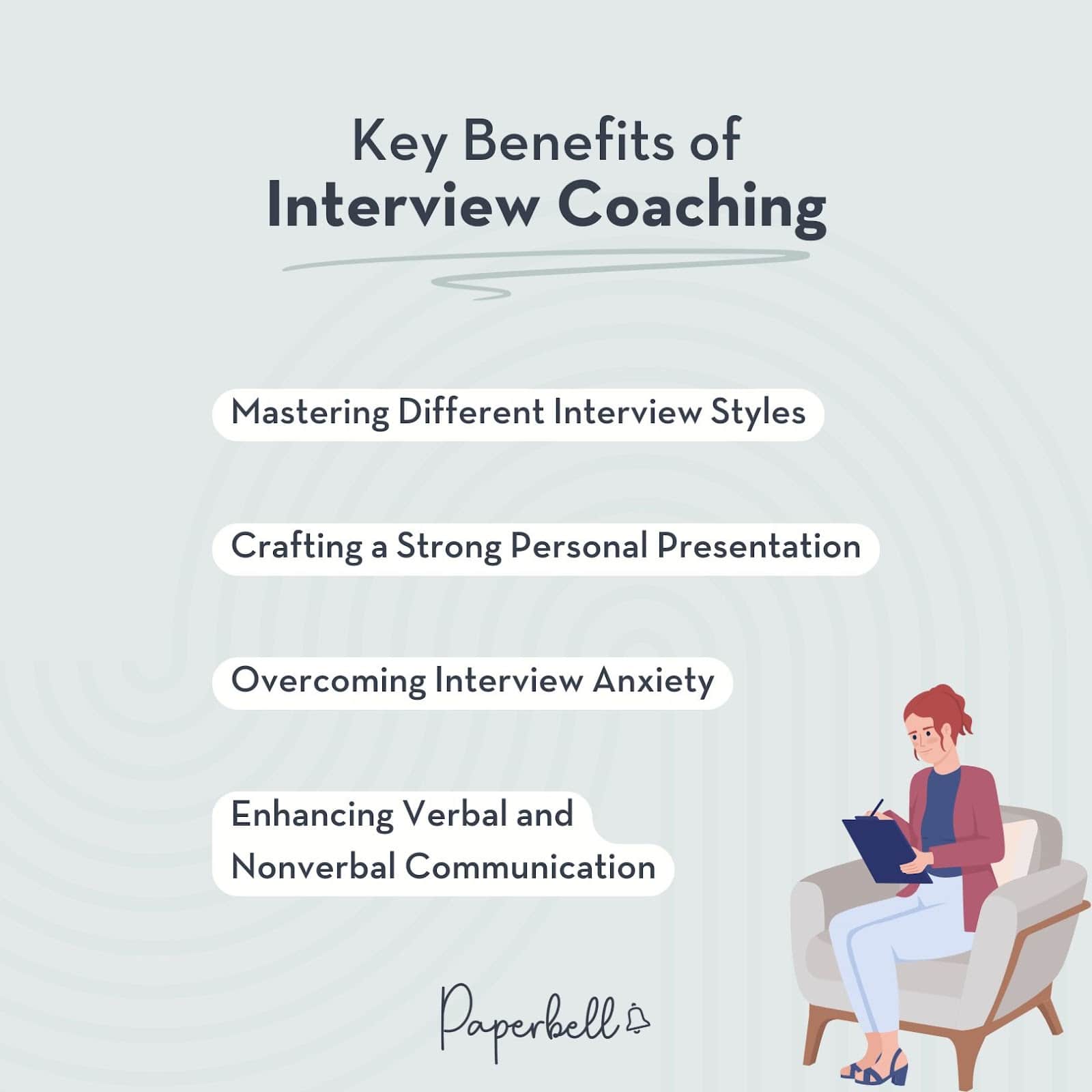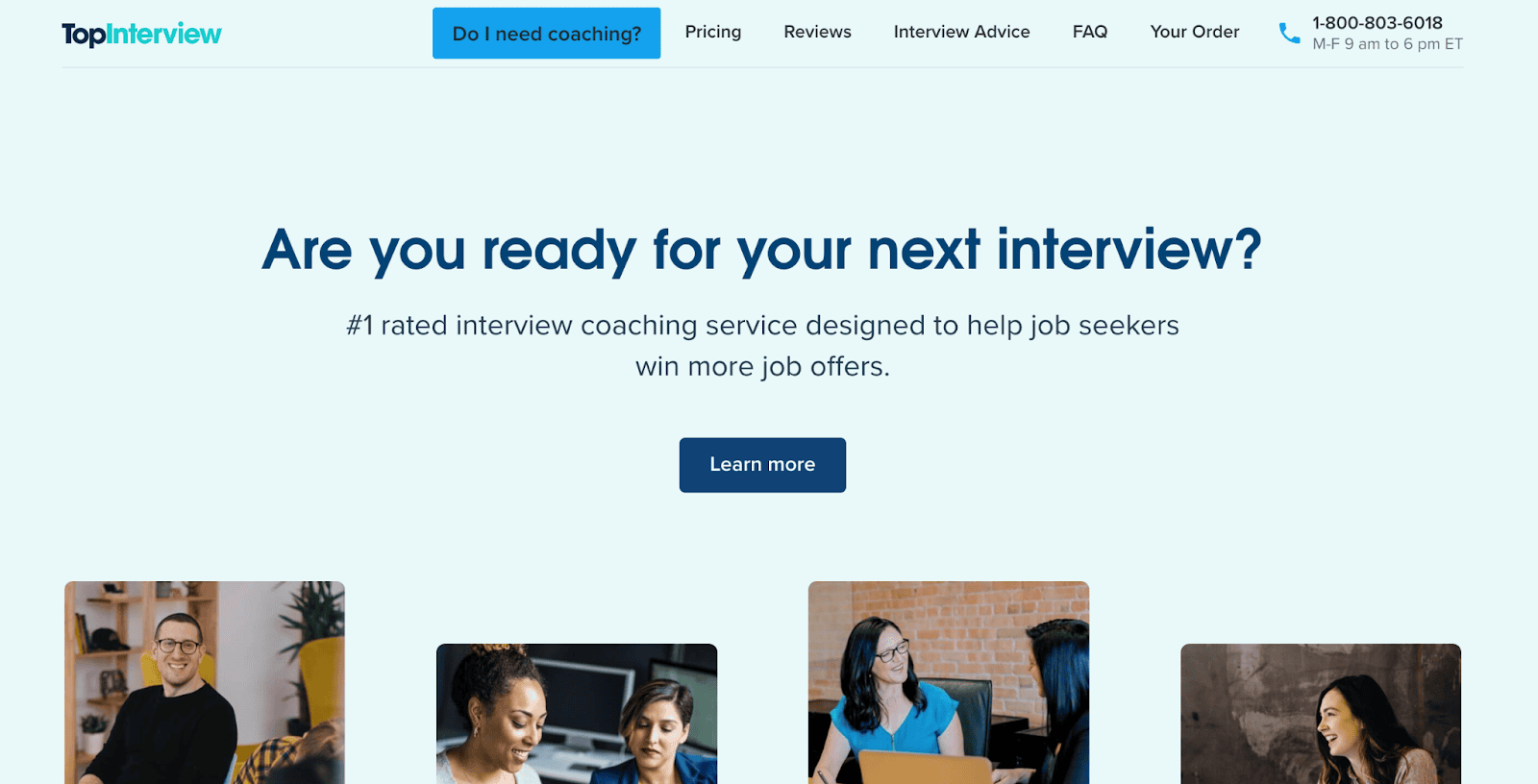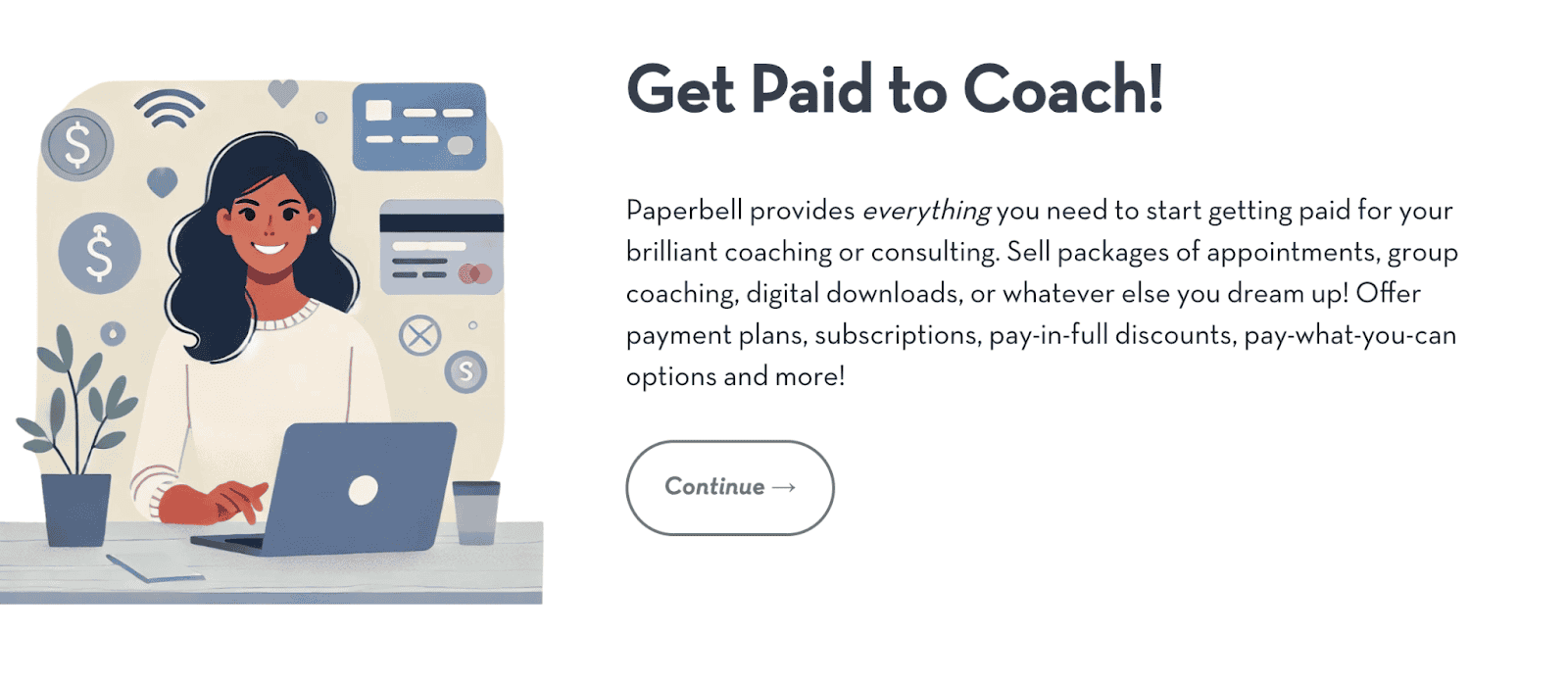On average, companies conduct between two to four interviews before making a final hiring decision. The more senior and high-stakes the position is, the more meetings it involves and the higher the pressure gets.
Some senior director positions have reported as many as 29 interviews for a single role, which would overwhelm even the most level-headed candidates.
Job seekers who experience performance anxiety or interview fatigue often turn to interview coaching to gain more confidence in selling themselves. Let’s look at how coaches prepare candidates for their dream roles.
What Is Interview Coaching?
Interview coaching helps job seekers present their best selves during conversations with recruiters. They learn to refine their answers to common questions and improve their body language to make the best impression.
It’s a structured process that involves both industry and role-specific interview advice and experiential learning through mock interviews. Instead of generic guidelines, interview coaches craft tailored feedback for their clients, depending on their career aspirations and the competition they’re up against.
How It Works
An interview coaching process typically starts with the candidate sharing their job expectations, background, and resume. This allows the coach to assess the candidate’s strengths and areas for improvement.
Based on this, the coach creates a personalized interview strategy for the client and a coaching plan to prepare them for it.
During one-on-one coaching sessions, they conduct mock interviews designed to simulate real-life scenarios the client might encounter when applying for their targeted role. These practice sessions help adjust their answers and communication style, then receive real-time feedback on their performance.
Interview coaching sessions are often recorded so clients can review their responses and how they present themselves.
Coaches can also provide detailed session notes and a custom action plan for the job candidate so they are clear on their next steps and can continue improving.
4 Key Benefits of Interview Coaching
1. Mastering Different Interview Styles
- Behavioral interviews: Learn to structure responses using techniques like the STAR method (Situation, Task, Action, Result) to effectively showcase your past experiences.
- Unstructured interviews: Improve communication skills to engage interviewers naturally and highlight your personality.
- Stress interviews: Practice handling pressure, rapid-fire questions, and unexpected challenges with composure.
- Salary negotiation: Gain confidence in discussing compensation and negotiating a fair offer.
2. Crafting a Strong Personal Presentation
- Develop a compelling elevator pitch to introduce yourself concisely and persuasively.
- Identify and highlight your strongest and most relevant experiences to align with job requirements.
- Learn how to communicate professionally with conviction for a lasting impression.
3. Overcoming Interview Anxiety
- Gain practical strategies to manage interview stress.
- Practice and refine your responses in a low-pressure environment.
4. Enhancing Verbal and Nonverbal Communication
- Adjust your body language to project confidence and authenticity.
- Learn the language of recruiters and hiring managers to tailor your responses to what lands.
- Develop thoughtful questions for interviewers to demonstrate preparation and evaluate your options.

Is Interview Coaching Worth It?
Interview coaching can be a game-changer for many job seekers and an investment that quickly pays off after landing a high-paying role. For others, it might not be as impactful.
Here are some pointers to evaluate whether it’s for you now.
When It’s Worth Investing in Interview Coaching
- You have interview anxiety: If job interviews stress you out and make you freeze up or act awkwardly under pressure, coaching can help you manage the pressure and develop strategies to stay composed.
- You’ve been getting interviews, but no job offers: If you’re consistently making it to the interview stage but not landing the job, you may need to work on how you’re presenting yourself and how you negotiate.
- You’re changing industries or roles: If you’re transitioning into a new field, you need to frame your past experience in a way that makes sense to employers. A coach can help you translate your skills and position you as a strong candidate.
- You’re applying for high-stakes positions: If you’re targeting executive or competitive roles with rigorous interview processes, coaching can give you the edge you need to outperform other candidates.
- You’re preparing for a unique or difficult interview format: Some industries use specialized interviews, such as case studies, technical tests, or panel interviews. A coach can help you practice for these specific formats and refine your approach.
- You need help with salary negotiation: If you’re unsure how to confidently discuss salary or benefits, coaching can help you approach the conversation strategically and maximize your compensation package.
When You Might Need Something Else
If you’re struggling to land a job, the problem isn’t always your interview performance. Here are some situations where you could benefit more from a different approach.
- You’re not sure what you want: If you’re unclear about your career direction, interview coaching alone won’t land you your dream job. Consider career coaching to build a clear vision and plan for your desired professional future.
- You’re not getting interviews: If you rarely make it past the application stage, the problem may lie in your resume or targeting the wrong positions. Resume writing services or broader career coaching might be a better starting point.
- You lack experience: If your background doesn’t match job requirements, you might need to upskill or gain relevant experience first through training or internships.
How Much Does Interview Coaching Cost?
Interview coaching fees depend on the exact services offered and the coach’s experience. Generally, session rates are between $50 to $500 per hour. Many coaches offer a combined package of multiple calls and additional support.
As an example, TopInterview offers interview coaching packages at $100-349 with one to three coaching sessions, play-by-play session notes, and custom action plans.

Lisa Tozer is an interview coach who offers packages at $1,485-2,420 with 3-4 sessions to senior executives and other professionals.
Hello Interview specializes in mock interviews for software engineers and costs $170-419 depending on seniority level.
How to Choose the Right Interview Coach
Not all coaches offer the expertise and approach you need. Here are some factors you can evaluate to find interview coaching services that best fit your needs and budget.
1. Specialized Expertise
Look for a coach who has experience in your field and understands the hiring process for the type of role you’re targeting. Industry-specific coaches can provide tailored guidance on the questions you’re likely to face and the skills employers value most.
- If you’re in tech, a coach specializing in technical interviews and system design is ideal.
- If you’re applying for executive roles, a coach with leadership hiring experience will help refine your executive presence.
- For behavioral interviews, a coach skilled in STAR-method responses can help you craft compelling stories.
2. Coaching Process
Some interview coaches focus on structured mock interviews, while others emphasize confidence-building or mindset coaching. Before committing, consider:
- Do you prefer a highly structured approach with detailed feedback?
- Do you need someone who can help with anxiety and confidence-building?
- Do you want a data-driven coach who provides measurable improvements?
Many coaches offer free consultations, so take advantage of this to see if their approach aligns with your needs.
3. Reviews
Check reviews and testimonials from past clients to gauge a coach’s effectiveness. Look for feedback on:
- Whether their coaching led to successful job offers.
- How personalized and actionable their advice was.
- If their coaching made a noticeable difference in their interview performance.
A coach with a strong track record of helping candidates secure jobs at competitive companies is a good sign.
4. Value for Money
Interview coaching varies in cost, so it’s important to find a balance between quality and affordability. Consider:
- Hourly rates vs. package deals: Some coaches offer single sessions, while others have bundled packages that provide ongoing support.
- Return on investment: If coaching helps you land a job with a significantly higher salary, it will pay for itself soon.
- Free resources: Some coaches offer trial sessions or access to free content, which can help you determine if coaching is necessary.
5. Session Format
Most coaches conduct sessions through a video call, but some might also offer phone consultations or in-person coaching.
Consider whether you prefer the flexibility of online scheduling and session recordings you can look back on later, or if an in-person mock interview session will help you gain more confidence for the big day.
6. Additional Support
Interview coaches often offer additional forms of support that round up the value of their packages, for example:
- Resume and LinkedIn profile reviews
- Salary negotiation strategies
- Follow-ups and communication protocol after a job interview
- Mock interview recordings and detailed, documented feedback
- Analysis of your strengths and weaknesses
- A breakdown of common interview questions at top companies
- Targeted support for technical, behavioral, unstructured, or stress interviews
If you want to focus on a specific aspect of interviewing, look for a coach who offers relevant services.
Becoming an Interview Coach
Want to help job candidates land their dream jobs for a living? Here’s how you can become an interview coach.
1. Get Trained
Consider getting certified in interview coaching (for example, through CIC or CEIC programs) to pick up coaching frameworks and job interview formats to help your clients succeed.
For example, the Professional Association of Résumé Writers & Career Coaches (PARWCC) offers Certified Interview Coach (CIC) certification at $970.
You can complete this self-paced program within a year (takes 2-3 months on average) and get proficient in interviewing techniques and managing interview anxiety.

Another alternative is the Certified Employment Interview Consultant (CEIC) certification that Career Directors offer at $1,997.
This self-paced program focuses on various interview strategies and formats in 18 modules you can complete within a year (most people need around 6 weeks).
Before you onboard your first client, gain practical experience through peer coaching or offering pro bono sessions. Conduct mock interviews and collect client feedback to measure the effectiveness of your coaching services.
2. Create Your Packages
Your coaching packages should align with the needs of job seekers in your niche. You can offer various options for one-time strategy sessions or mock interviews and multi-session packages for a more comprehensive process.
You can set up your packages in Paperbell with a custom pricing structure—hourly rates, package deals, installments, or subscriptions—and automatically get a coaching website created for them. Each service gets its own subpage with an easy sign-up process for clients.
3. Set Up Your Practice
If you’re launching your own coaching practice, you must register your business and provide a payment and booking system for new intake. A professional website is essential for showcasing your services, credentials, and testimonials.

Paperbell simplifies this with an all-in-one coaching system that handles the following:
- Your website
- Client onboarding
- Payments
- Scheduling
- Contracts
- Session notes
- Surveys
- Automated reminders
- Client portal
4. Get Your First Clients
Tap into your network! Former colleagues, recruiters, and HR professionals can be great referral sources. Offer a few free or discounted sessions to get testimonials as proof of your coaching results.
Create valuable content for LinkedIn and other platforms where job seekers search for advice. Lead magnets like interview checklists or free webinars can attract potential clients too. As you build credibility, encourage satisfied clients to refer others and leave reviews to grow your practice.
FAQ for Job Seekers
How Much Does Interview Coaching Cost?
Interview coaching prices vary based on the coach’s expertise and package structure. Individual sessions normally fall somewhere between $50 to $500.
Is It Worth the Investment?
If you’re struggling to get through the interview stage of the hiring process despite strong qualifications, coaching can help you prepare for them strategically and show up confidently. It’s especially valuable for competitive and senior roles.
How Many Sessions Do I Need?
It depends on the role you’re trying to land and your current interview skills. Some people only need 1-2 sessions for quick refinements, while others need 4-6 sessions for multiple mock interviews and skill development.
What Results Can I Expect?
You’ll get better at presenting yourself and answering interview questions confidently. Performing better in interviews will help you get better job offers and negotiate a higher salary.
FAQ for Interview Coaches
Do I Need Certification?
While not mandatory, certifications like CIC or CEIC train you on proven frameworks, industry knowledge, and coaching techniques. Earning relevant credentials also makes it easier to attract clients.
How Do I Set My Rates?
Compare your expertise and experience to other coaches in your niche and consider the spending capacity of your target clients. Interview coaches generally charge anywhere between $50 and $500 per session or offer package deals with a set of sessions and other services.
What Equipment Do I Need?
Make sure you have a professional setup for online sessions: a good microphone, camera, reliable internet, and video software like Zoom for recording. Tools like Paperbell take care of your client onboarding and management, from booking to payments.
How Do I Find Clients?
Start by reaching out to your professional network to ask for referrals. You can offer a few pro bono sessions in exchange for feedback and testimonials. Then you can leverage testimonials along with valuable content to market yourself through social media, an email list, and webinars.










